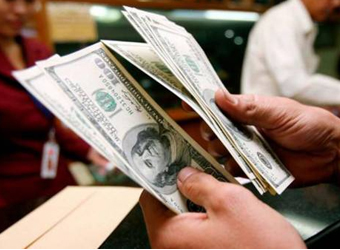Dollar prices edged higher against a basket of major currencies on Friday, extending its recovery from a three-year low last week, as the potential for a more aggressive U.S. Federal Reserve prompted investors to pare bearish bets against the greenback.
The dollar index, which measures the greenback against a basket of six other major currencies, was up 0.17 percent at 89.89. The index hit a three-year low of 88.253 on February 16.
Rising Treasury yields, a view that the dollar’s sell-off had been overdone, and minutes from the Fed’s January rate-setting meeting that offered a relatively upbeat tone helped the index notch a gain of 0.9 percent this week.
“You have seen sentiment around the dollar shift,” said Charles Tomes, senior investment analyst and trader at Manulife Asset Management, in Boston.
“A lot of market participants are taking some risk off the table if they did have longs in other strategies,” he said.
Federal Reserve Chair Jerome Powell’s first semi-annual testimony to Congress on Tuesday will be watched for any update on the central bank’s economic forecasts.
“If investors were short the U.S. dollar, they don’t want to take on that risk in case he is more hawkish,” Tomes said.
On Friday, commentary from a host of Fed speakers, including New York Fed President William Dudley, and the Cleveland Fed’s Loretta Mester and their San Francisco counterpart, John Williams, all members of the rate-setting committee this year, could offer insights into the Fed’s thinking on monetary policy.
The euro edged lower against the dollar, pressured by the greenback’s stronger tone and by investor caution ahead of the outcome of the Italian general election on March 4. It was last down 0.29 percent at 1.2293.
A German Social Democrats’ poll of its members on joining another coalition government with Chancellor Angela Merkels conservatives is also due that day, two big political risk events for markets.
“For people that are bullish on the euro, there is nothing new to get people to increase positions,” he said.
The Australian and New Zealand dollars slipped as investors bet interest rates in the two countries will remain at record lows while the United States continues to tighten policy.
The Canadian dollar edged higher against its broadly firmer U.S. counterpart after data showed Canada’s inflation cooled less than economists had expected. Source: Reuters
Source: Reuters
